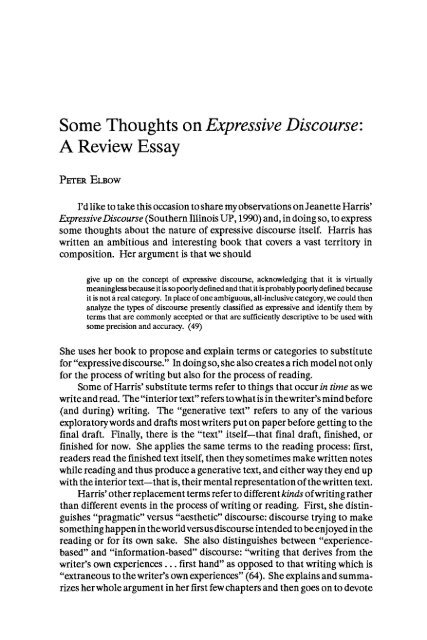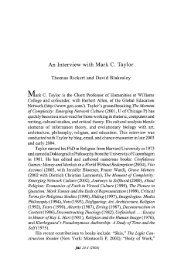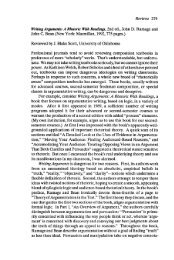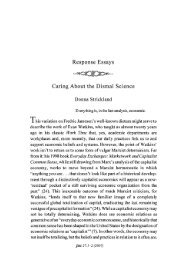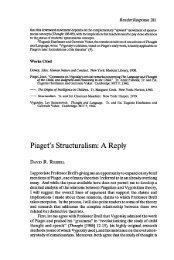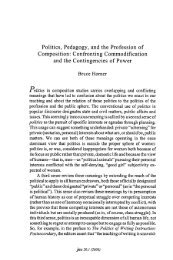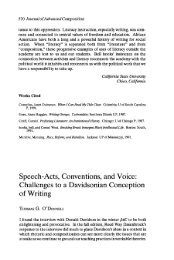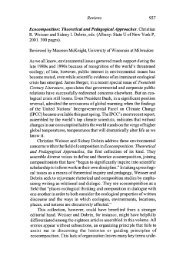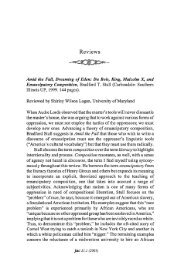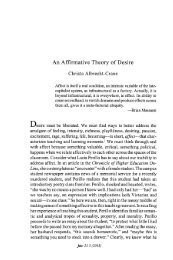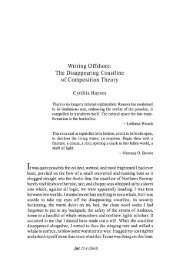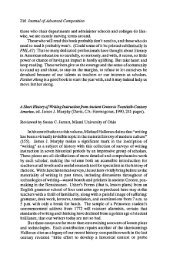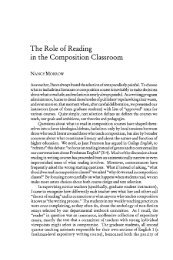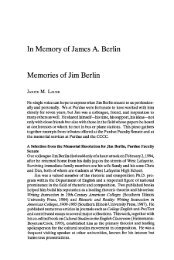Some Thoughts on Expressive Discourse: A Review ... - JAC Online
Some Thoughts on Expressive Discourse: A Review ... - JAC Online
Some Thoughts on Expressive Discourse: A Review ... - JAC Online
You also want an ePaper? Increase the reach of your titles
YUMPU automatically turns print PDFs into web optimized ePapers that Google loves.
<str<strong>on</strong>g>Some</str<strong>on</strong>g> <str<strong>on</strong>g>Thoughts</str<strong>on</strong>g> <strong>on</strong> <strong>Expressive</strong> <strong>Discourse</strong>:<br />
A <strong>Review</strong> Essay<br />
PETER ELBOW<br />
I'd like to take this occasi<strong>on</strong> to share my observati<strong>on</strong>s <strong>on</strong> Jeanette Harris'<br />
<strong>Expressive</strong> <strong>Discourse</strong> (Southern lllinois UP, 1990) and, in doing so, to express<br />
some thoughts about the nature of expressive discourse itself. Harris has<br />
written an ambitious and interesting book that covers a vast territory in<br />
compositi<strong>on</strong>. Her argument is that we should<br />
give up <strong>on</strong> the c<strong>on</strong>cept of expressive discourse, acknowledging that it is virtually<br />
meaningless because it is so poorly defined and that it is probably poorly defined because<br />
it is not Ii real category. In place of <strong>on</strong>e ambiguous, all-inclusive category, we could then<br />
analyze the types of discourse presently classified as expressive and identify them by<br />
terms that are comm<strong>on</strong>ly accepted or that are sufficiently descriptive to be used with<br />
some precisi<strong>on</strong> and accuracy. (49)<br />
She uses her book to propose and explain terms or categories to substitute<br />
for "expressive discourse." In doing so, she also creates a rich model not <strong>on</strong>ly<br />
for the process of writing but also for the process of reading.<br />
<str<strong>on</strong>g>Some</str<strong>on</strong>g> of Harris' substitute terms refer to things that occur in time as we<br />
write and read. The "interior text" refers to what is in the writer's mind before<br />
(and during) writing. The "generative text" refers to any of the various<br />
exploratory words and drafts most writers put <strong>on</strong> paper before getting to the<br />
final draft. Finally, there is the "text" itself-that final draft, finished, or<br />
finished for now. She applies the same terms to the reading process: first,<br />
readers read the finished text itself, then they sometimes make written notes<br />
while reading and thus produce a generative text, and either way they end up<br />
with the interior text-that is, their mental representati<strong>on</strong> of the written text.<br />
Harris' other replacement terms refer to different kinds of writing rather<br />
than different events in the process of writing or reading. First, she distinguishes<br />
"pragmatic" versus "aesthetic" discourse: discourse trying to make<br />
something happen in the world versus discourse intended to be enjoyed in the<br />
reading or for its own sake. She also distinguishes between "experiencebased"<br />
and "informati<strong>on</strong>-based" discourse: ''writing that derives from the<br />
writer's own experiences ... first hand" as opposed to that writing which is<br />
"extraneous to the writer's own experiences" (64). She explains and summarizes<br />
her whole argument in her first few chapters and then goes <strong>on</strong> to devote
84 Journal of Advanced Compositi<strong>on</strong><br />
<strong>on</strong>e chapter each to exploring her replacement categories in greater detail.<br />
Her final chapter focuses mostly <strong>on</strong> pedagogical implicati<strong>on</strong>s.<br />
Mapping the World of <strong>Expressive</strong> <strong>Discourse</strong><br />
I need to sound a pers<strong>on</strong>al or expressive note atthis point. Because I will<br />
voice some sub,litantial misgivings about this book (al<strong>on</strong>g with substantial<br />
respect),I need to make it clear that I didn't go out of my way to reviewi t. Two<br />
journals, in fact, sent me copies and asked me to write a review. I naively<br />
accepted the first invitati<strong>on</strong> before reading the book, thinking, "Why not?<br />
I'm interested in expressive discourse and have to read this book." I thought<br />
the job would be easy and pleasant, but I've had a struggle with this review.<br />
There is much I see as reas<strong>on</strong>able, interesting, and useful in Harris' book, yet<br />
I often sense a lurking edge and even animus in it and often find myself<br />
bothered and resistant. "But wait a minute," I often had to say to myself,<br />
"maybe the <strong>on</strong>ly reas<strong>on</strong> you get itchy or annoyed is that you have a pers<strong>on</strong>al<br />
stake here." Harris, you see, gives me prominence as a promoter of expressive<br />
discourse and of what she calls expressive pedagogy or "rhetorical<br />
expressi<strong>on</strong>ism," and I'm not happy with how she represents me. I've had to<br />
fight my way to a sympathetic reading that shows the book's virtues. In effect,<br />
I've found it helpful to play the doubting game and the believing game with<br />
the book.<br />
I didn't start out resistant. When I first discovered, thumbing through<br />
the book, that she wanted to get rid of expressive discourse as a category in<br />
our discipline, I was intrigued-even attracted. Not just because I d<strong>on</strong>'t find<br />
the word "expressive" particularly central to my own lexic<strong>on</strong>, nor just<br />
because I too sometimes w<strong>on</strong>der what the word means, but most of all, quite<br />
frankly, because I find these days that the term is mostly used as a stick to beat<br />
me over the head with. My hopes were dashed, however, when I found that<br />
she is <strong>on</strong>ly trying to get rid of the term "expressive discourse" but that she<br />
wants to keep the terms "expressive pedagogy" and "expressive theory" and<br />
"rhetorical expressi<strong>on</strong>ism" for people like me-for the general school of<br />
thought that Berlin gave that label to. Unfortunately, she seems to want to<br />
hang <strong>on</strong>to the term "expressive" so that she too can c<strong>on</strong>tinue to beat<br />
"expressivists" about the head and shoulders.<br />
That is, even though she takes a kind of detached judicious t<strong>on</strong>e throughout<br />
the book-proposing in a disinterested stance simply to get rid of inaccurate<br />
terminology or c<strong>on</strong>fusing categories-her treatment of people interested<br />
in pers<strong>on</strong>al or expressive writing seems to me so polemically distorted<br />
as to belie her stance or voice. Here is how she sums up the work of the<br />
"rhetorical expressi<strong>on</strong>ists" (naming James Britt<strong>on</strong>, William Coles, Lou<br />
Kelly, Ken Macrorie, D<strong>on</strong>ald Murray, D<strong>on</strong>ald Stewart, and me):<br />
The rhetorical expressi<strong>on</strong>ists viewed writing not as a rhetorical act or a practical means<br />
of communicati<strong>on</strong> but as a way of helping students become emoti<strong>on</strong>ally and psychologically<br />
healthier and happier, more fulfilled and self-actualized. (28)
<strong>Expressive</strong> Writing 85<br />
Although she makes a qualifying statement that people like us sometimes<br />
take "increased skill in writing and clear communicati<strong>on</strong>" as "indirect goals,"<br />
her c<strong>on</strong>clusi<strong>on</strong> is that "such an approach clearly precludes any emphasis <strong>on</strong><br />
c<strong>on</strong>tent or skills as essential elements of good writing" (27-28). These are not<br />
stray comments <strong>on</strong> the fringe but are, in fact, the central statements in an<br />
amazingly short analysiS of the so called expressive movement-presumably<br />
the main foundati<strong>on</strong> of her book.<br />
It seems to me that if some<strong>on</strong>e is going to focus a whole book <strong>on</strong> a<br />
particular intellectual movement, he or she has an obligati<strong>on</strong> to understand<br />
it and to present it more accurately and in more detail-not just look at it<br />
through an inverted telescope as an alien threat. Berlin was trying to take a<br />
satellite snapshot of the whole compositi<strong>on</strong> globe and wasn't much interested<br />
in that regi<strong>on</strong> he oversimply and unfortunately labeled "expressive."<br />
But Harris is trying to zoom in and take a close-up picture or draw a careful<br />
map of just this <strong>on</strong>e regi<strong>on</strong>, and so I cannot help asking that she be able to see<br />
it a bit more carefully and accurately. After all, she prominently announces<br />
that the entire goal of her book is to get rid of inaccuracies that stem from<br />
false or oversimple categories.<br />
Thus, I became an itchy resistant reader early in my reading and noticed<br />
things like the following.<br />
She sums up the entire medieval period as follows: "During this lengthy<br />
period of history there was little interest in individual emoti<strong>on</strong>s or experiences<br />
.... The work of artists and writers primarily reflected Church dogma"<br />
(5-6). Can she really be imagining actual readers when she makes a claim like<br />
this, readers who have actually read more than cursorily in the medieval<br />
period? C<strong>on</strong>sider Chaucer, especially Troilus and Criseyde. She allows<br />
herself other similarly reductive overSimplificati<strong>on</strong>s of history or cultural<br />
Change-the kind of statements that see history as a battlefield where disembodied<br />
"isms" and "fields" are the causes of everything that happens (as in<br />
notes from a survey lecture course). Thus:<br />
Empiricism c<strong>on</strong>tributed to the percepti<strong>on</strong> that an individual can discern knowledge<br />
through his or her senses, idealism asserted that <strong>on</strong>e can discover the nature of reality<br />
through introspecti<strong>on</strong> or a knowledge of self; phenomenology emphasized a subjective<br />
apprehensi<strong>on</strong> of physical reality; and existentialism assumed there was nothing bey<strong>on</strong>d<br />
the self. (10)<br />
Another pervasive influence <strong>on</strong> rhetorical expressi<strong>on</strong>ism is romanticism. [She is not<br />
summing up a full analysis of romanticism or a story about real people, this is it.] (29)<br />
Psychology [in the nineteenth century] has, in effect, given credibility to emoti<strong>on</strong>,<br />
elevating it to equal status with cogniti<strong>on</strong>. [No <strong>on</strong>e believed in emoti<strong>on</strong> till the field of<br />
psychology came al<strong>on</strong>g?] (13)
86 Journal of Advanced Compositi<strong>on</strong><br />
I d<strong>on</strong>'t see much hope of overcoming the tendency ofliterary scholars to<br />
c<strong>on</strong>descend to the field of compositi<strong>on</strong> till compositi<strong>on</strong> scholars stop using<br />
canned intellectual history-until they, for example, stop summing up Plato<br />
or Aristotle in just a few sentences from a sec<strong>on</strong>dary source as Berlin does.<br />
Even when it comes to the meat and potatoes of compositi<strong>on</strong> issues, Harris<br />
permits herself this remarkable generalizati<strong>on</strong>: "Professi<strong>on</strong>al writers usually<br />
have well-defined writing tasks and do not need to discover and narrow a<br />
topic or to explore their feelings" (%). These are not just oversimplificati<strong>on</strong>s<br />
hastily created for decorative background filler; they are central building<br />
blocks of her argument. She speaks in passing of how ethos is a maueroft<strong>on</strong>e<br />
of voice, not c<strong>on</strong>sidering how much it is produced by the trustworthiness of<br />
informati<strong>on</strong> and thinking.<br />
The Dangers of Expressivism?<br />
What helped me get past a resistant reading was to realize that the book<br />
has, in fact, two different arguments or projects: the first argument is against<br />
the term "expressive discourse," and the sec<strong>on</strong>d is against the thing itself; the<br />
first is theoretical and has to do with how we describe and classify discourse,<br />
and the sec<strong>on</strong>d is practical and pedagogical; the first is prominently announced<br />
as the object of the book, occupying most of the writer's direct<br />
attenti<strong>on</strong>, and the sec<strong>on</strong>d is kind of slipped in-at points almost denied. Most<br />
important of all, Harris implies that her first argument about categories<br />
logically entails her sec<strong>on</strong>d argument about practical pedagogy-whereas I<br />
cannot see any necessary c<strong>on</strong>necti<strong>on</strong>. Thus, the two arguments or goals of the<br />
book get tangled up in each other, with the sec<strong>on</strong>d <strong>on</strong>e undermining the effectiveness<br />
of the whole enterprise. Let me explain.<br />
Whenever Harris talks about the goal or purpose of the book, she<br />
implies a kind of disinterested c<strong>on</strong>cern with greater accuracy and precisi<strong>on</strong><br />
in the scholarly task of describing and classifying discourse. Again and again<br />
she protests that she is not trying to wipe out expressive discourse. And she<br />
does indeed find ample place in her scheme for everything that the term has<br />
stood for; in fact, she provides much more semantic space with her replacement<br />
categories than the term expressive has usually occupied. On several<br />
occasi<strong>on</strong>s she even expresses a strikingly genial or accepting pOSiti<strong>on</strong> about<br />
the "pers<strong>on</strong>al" and "expressive" dimensi<strong>on</strong>s in writing:<br />
<strong>Discourse</strong> that is based <strong>on</strong> both experience and informati<strong>on</strong> has the advantages of both:<br />
it communicates informati<strong>on</strong> derived from other sources as well as the writer's own experiences<br />
and ideas but is marked by the writer's pers<strong>on</strong>al style and voice rather than the<br />
an<strong>on</strong>ymous sterility that frequently characterizes discourse that is based exclusively <strong>on</strong><br />
informati<strong>on</strong>. (187)<br />
Yet, the book seems to me equally dominated by the impulse to push<br />
away expressive discourse itself. A couple of remarks made <strong>on</strong>ly in passing
<strong>Expressive</strong> Writing 87<br />
serve to signal that Harris actually sees an enormous danger in expressive<br />
discourse. She notes two threats. First, she implies that many teachers or<br />
theorists think expressive discourse is inherently "superior" to other kinds of<br />
discourse: "As l<strong>on</strong>g as we c<strong>on</strong>tinue to think of experience-based writing as<br />
expressive discourse, a type of writing that is c<strong>on</strong>sidered superior to other<br />
discourse, we are not giving students an accurate percepti<strong>on</strong> of how mature<br />
writers and readers c<strong>on</strong>struct a text" (166). I can't see how even enthusiasts<br />
like Britt<strong>on</strong>, Murray, and 1 can be read as saying expressive writing is<br />
"superior." Yes, Britt<strong>on</strong> argues for more of it, but it's because he finds <strong>on</strong>ly<br />
five percent of school writing to be expressive. (I would grant that he c<strong>on</strong>fuses<br />
things by using "expressive" to stand for all exploratory writing, even if it is<br />
writing that explores in a detached way the opti<strong>on</strong>s in a geometry proof. ) But<br />
n<strong>on</strong>e of these things amounts to calling expressive discourse "better." It<br />
seems odd or quaint to call <strong>on</strong>e kind of discourse inherently better or worse<br />
than others; yet, at times it is she who drifts in that naive directi<strong>on</strong>:<br />
<str<strong>on</strong>g>Some</str<strong>on</strong>g> teachers are beginning to questi<strong>on</strong> the validity of an approach that encourages<br />
narrati<strong>on</strong> and descripti<strong>on</strong> as ends in themselves and that does not require students to<br />
attempt more challenging writing tasks in which they must make rhetorical choices about<br />
audience and purpose, internalize and synthesize informati<strong>on</strong> from other sources,<br />
discuss abstracti<strong>on</strong>s, formulate and articulate ideas based <strong>on</strong> their own observati<strong>on</strong>s and<br />
generalizati<strong>on</strong>s, and learn to use inventi<strong>on</strong> strategies that go bey<strong>on</strong>d simply recalling past<br />
experiences. (176-77)<br />
Ficti<strong>on</strong> or n<strong>on</strong>ficti<strong>on</strong> narrative/descriptive forms are lower, unrhetorical,<br />
unthoughtful species of discourse? (It is true that many people say that<br />
writing with some pers<strong>on</strong>al investment or voice in it is better than "an<strong>on</strong>ymous<br />
sterility." But, of course, this is exactly what Harris says, quoted above,<br />
so she can't be calling this opini<strong>on</strong> a threat or danger.)<br />
She sees a sec<strong>on</strong>d danger in expressive discourse-not just as a type of<br />
writing but as a process. That is, she implies that expressive discourse is<br />
taking over the teaching of writing and that many teachers and theorists want<br />
to assign nothing but writing about pers<strong>on</strong>al experiences, not writing about<br />
informati<strong>on</strong>, data, or ideas:<br />
However in recent years, the balance between these two broad purposes [pragmatic and<br />
aesthetic discourse] has frequently shifted toward aesthetic because of the emphasis <strong>on</strong><br />
expressive writing. Since literature is vaguely perceived as expressive, many compositi<strong>on</strong><br />
courses are largely devoted to teaching students how to write literary discourse ...<br />
Because compositi<strong>on</strong> is so often perceived as the stepchild ofliterature, it is not easy to<br />
establish the equality of pragmatic discourse in the compositi<strong>on</strong> class. (185)<br />
This too seems to me an unrealistic fear. 1 get to see a lot of writing courses<br />
and writing programs, and I d<strong>on</strong>'t know any that call for nothing but<br />
expressive writing about <strong>on</strong>e's own pers<strong>on</strong>al experiences. (I suppose that<br />
what we really have here is an amusing intersecti<strong>on</strong> of competing paranoias:
88 Journal of Advanced Compositi<strong>on</strong><br />
she sees "expressivists" taking over the world, while I'm more fearful of the<br />
anti-expressive movement taking over the world. But I hope I've never<br />
resorted to calling pragmatic discourse "unworthy" or "inferior.")<br />
It's not that Harris is trying to get rid of all expressive discourse, but she<br />
asserts am<strong>on</strong>g the c<strong>on</strong>clusi<strong>on</strong>s of her book ("C<strong>on</strong>clusi<strong>on</strong>s and Implicati<strong>on</strong>s"<br />
is the title of her last chapter) that writing teachers should cease certain<br />
pedagogical practices that she sees as central to the expressive traditi<strong>on</strong>.<br />
First, though she says she approves of a prose style that mixes experiencedbased<br />
and informati<strong>on</strong>-based discourse (187), she c<strong>on</strong>cludes that teachers<br />
should not invite or allow students to write about their own experiences<br />
unmixed-that is, unless these experiences are brought into an "informati<strong>on</strong>based"<br />
enterprise involving reading or research that brings "informati<strong>on</strong><br />
derived from other sources" (187).<br />
Sec<strong>on</strong>d, she c<strong>on</strong>cludes that students should not engage in writing "without<br />
any plan for developing these into more structured texts but merely to<br />
give the students additi<strong>on</strong>al practice" (183). That is, she says students should<br />
never write as an exercise-as freewriting, for exploring, for warming up, for<br />
following our noses-(with, to my mind, all that this practice entails of<br />
discovery, surprise, lowered stakes, and opening up of style and voice). She<br />
admits that "writing-to-Iearn" exercises might be useful in a subject matter<br />
course, but the goal of such exercises is to learn subject matter, not to improve<br />
writing; therefore, they d<strong>on</strong>'t bel<strong>on</strong>g in a writing course.<br />
Third, she inveighs against inviting students ever to believe that they<br />
could write for an audience of self. She bases her positi<strong>on</strong> <strong>on</strong> a piece ofa priori<br />
reas<strong>on</strong>ing-namely, that she cannot c<strong>on</strong>ceive of writing that is not for others:<br />
Even though in an earlier draft of this book I combined writing-for-selfwith writing-inprogress,<br />
what I now term a generative text, I later came to the c<strong>on</strong>clusi<strong>on</strong> that the two<br />
were not the same, not <strong>on</strong>ly because <strong>on</strong>e is a form of text and the other a type of discourse<br />
but also because I can c<strong>on</strong>ceive of no significant instance in which a writer does not think<br />
in terms of a possible audience. (66)<br />
She has, it is true, the grace to hedge <strong>on</strong> this matter: "It is c<strong>on</strong>ceivable that<br />
certain writers may have mastered the art of writing-to-discover to the extent<br />
that they have no thought, at least no c<strong>on</strong>scious thought, of an audience"<br />
(68). But she ends the discussi<strong>on</strong> (and other discussi<strong>on</strong>s of private writing)<br />
with a universal c<strong>on</strong>clusi<strong>on</strong> that implies there are no questi<strong>on</strong>s about this<br />
matter: "Writing-for-self does not exist in any real sense .... Ultimately all<br />
discourse is intended for an audience other than the self who is doing the<br />
writing" (68-69).<br />
In the end, I cannot see how her theoretical model bolsters her pedagogical<br />
preferences, how her main argument about theoretical categories of<br />
discourse and text entails her prescripti<strong>on</strong>s against pedagogical practices she<br />
calls "expressive," despite her implicati<strong>on</strong> that it does. Translating this to a
<strong>Expressive</strong> Writing 89<br />
pers<strong>on</strong>al level, I finally realized that I could allow myself not <strong>on</strong>ly to get<br />
intrigued but even attracted to her theoretical model and still not have to<br />
renounce all these practices that she thinks d<strong>on</strong>'t exist or that I shouldn't use<br />
in my teaching and my writing: writing for an audience of self; writing wholly<br />
about <strong>on</strong>e's own experience; freewriting and exploratory or exercise writing<br />
that is not meant to be developed into a more structured text or finished<br />
product. Her interesting categories of discourse and her illuminating model<br />
would work fine to help the professi<strong>on</strong> see and talk more clearly about all<br />
these disputed practices; they would provide us with good tools even if we<br />
want to argue for them. Her model of discourses makes a perfectly comfortable<br />
place even for the species of discourse or behavior she calls<br />
n<strong>on</strong>existent-writing <strong>on</strong>ly for the self-for there is nothing inherent in her<br />
model of generative text or text itself that entails her pers<strong>on</strong>al beliefthat they<br />
are always for readers other than self.<br />
I find, therefore, that <strong>on</strong>ce I untangle the troubling subtext I have no<br />
difficulty giving an interested and respectful reading to her main enterprise.<br />
Let me focus <strong>on</strong> it for the rest of this review. I will questi<strong>on</strong> some points she<br />
has made, but I think it will be clear that I am airing these questi<strong>on</strong>s not out<br />
of a wish to criticize but out of my own genuine uncertainties and in order to<br />
communicate better some ofthe interesting cruxes in her proposals. In every<br />
case, I feel grateful and respectful about what she is proposing in this major<br />
dimensi<strong>on</strong> of her book. Her proposed terms or categories not <strong>on</strong>ly clarify my<br />
thinking, but in the last analysis I think she might be right. I end up torn.<br />
<str<strong>on</strong>g>Some</str<strong>on</strong>g> Key Questi<strong>on</strong>s<br />
Harris does indeed show how theorists have allowed the term "expressivediscourse"<br />
to slide allover the map. Besides the more obvious meanings,<br />
we see people like Kinneavy saying that all discourse comes from an expressive<br />
impulse, people like Britt<strong>on</strong> saying that expressive discourse is the<br />
matrix from which all other discourse comes, and a frequent tendency for<br />
people to talk of all literature as expressive. I guess I have a few hesitati<strong>on</strong>s<br />
about whether this means we actually have to get rid of the term, or can, for<br />
what she herself calls the "core" meaning is str<strong>on</strong>g and clear: "One of the few<br />
stable criteria for describing expressive discourse has been its subjectivity-the<br />
idea that it reveals something about the pers<strong>on</strong> who created it" (145). Thus,<br />
it might make more sense simply to define the term that way and then go <strong>on</strong><br />
to acknowledge that there have also been certain other extreme or ambitious<br />
definiti<strong>on</strong>s that we would do well to recognize as special senses of the term.<br />
After all, not many people seem to use the word "expressive" for a rough<br />
messy disorganized first draft of a grant proposal or a descripti<strong>on</strong> of the organizati<strong>on</strong>al<br />
structure of a company just because it is a rough, messy,<br />
disorganized first draft-so l<strong>on</strong>g as it is primarily factual and detached. C<strong>on</strong>versely,<br />
not many people seem to deny the term expressive to a piece of<br />
writing that is very pers<strong>on</strong>al, subjective and full of the affect, pers<strong>on</strong>a, self, or
90 Journal of Advanced Compositi<strong>on</strong><br />
alleged self of the writer just because it has been cannily crafted and<br />
painstakingly revised through seven drafts. What is inner or prior or careless<br />
is no more inherently expressive than what is outer or later or careful.<br />
Nevertheless, despite these hesitati<strong>on</strong>s, I am persuaded by Harris not<br />
<strong>on</strong>ly that "expressive" is a slippery term but that more than most words in the<br />
discipline,}t has become a site for ideological mud-wrestling. In the end, I'd<br />
love to go al<strong>on</strong>g with her clear-the-decks instinct and simply tear that page<br />
out of the dicti<strong>on</strong>ary-so l<strong>on</strong>g as she's willing also to tear out "expressive<br />
pedagogy" and "rhetorical expressi<strong>on</strong>ists."<br />
Besides, she doesn't have to kill off "expressive" as a term to make way<br />
for her new categories; they are remarkably sturdy and useful <strong>on</strong> their own<br />
feet. They are much more precise and practical, and, in additi<strong>on</strong> (and I<br />
particularly appreciate this), they are sophisticated and complex. That is,<br />
avoiding boxes or pige<strong>on</strong> holes, she makes it clear that these different "kinds<br />
of discourse" are really abstract or theoretical end points <strong>on</strong> various c<strong>on</strong>tinua<br />
rather than fully stable discernible entities. She acknowledges that actual<br />
pieces of writing always exist at some point al<strong>on</strong>g the c<strong>on</strong>tinuum between two<br />
ends (though she insists that <strong>on</strong>e type or another usually predominates). She<br />
sees these c<strong>on</strong>tinua operating in various dimensi<strong>on</strong>s: pragmatic discourse is<br />
not always informati<strong>on</strong>-based but it can be experienced-based too; c<strong>on</strong>versely,<br />
aesthetic discourse is not always experience-based but can equally<br />
well be informati<strong>on</strong>-based. She acknowledges that few of these kinds of<br />
discourse can be identified by actual textual features: aesthetic and pragmatic<br />
discourse are distinguishable by the purposes to which the texts are put (not<br />
by actual features of the texts themselves); experience-based and informati<strong>on</strong>-based<br />
discourse are distinguishable by the building blocks they make use<br />
of, not the rhetorical purposes these blocks are used for.<br />
I struggle a bit with Harris' distincti<strong>on</strong> between "aesthetic" and "pragmatic"<br />
discourse. On the <strong>on</strong>e hand, I have always found this distincti<strong>on</strong> from<br />
Rosenblatt to be useful. Harris handles it carefully, as Rosenblatt does,<br />
emphasizing that the issue is the subtle <strong>on</strong>e of how a text is being used (by<br />
reader and writer) rather than of unambiguous identifiable features themselves.<br />
(William Stafford provides the paradigm example. He had a beautiful<br />
calligraphic "No Smoking" sign in his office that deterred a friend from<br />
smoking; but when Stafford happened to refer to it as a poem, the friend immediately<br />
lit up his cigarette.) And yet, <strong>on</strong> the other hand, this central<br />
distincti<strong>on</strong> in her book-that aesthetic discourse, "like all art, even bad art,<br />
exists for its own sake" -surely flies directly in the face of <strong>on</strong>e of her other<br />
emphases: the centrality of the rhetorical view oflanguage. She happens to<br />
quote Wayne Booth in this chapter,yet did he not make a c<strong>on</strong>vincing case that<br />
even works of art are rhetorical, are attempts to do something to people, never<br />
merely for their own sake, and are thus pragmatic-and this not just "by the<br />
way" but as central to their being? It is true that she struggles with and hedges<br />
this distincti<strong>on</strong>, but in the end she insists <strong>on</strong> it.
<strong>Expressive</strong> Writing 91<br />
I feel Harris pulling in two directi<strong>on</strong>s in her treatment of interior text.<br />
On the <strong>on</strong>e hand, she insists <strong>on</strong> the "closeness" or "relatedness" between<br />
interior text and final text. That is, using the metaphor of "embryo," she<br />
insists that the interior text carries the genes or eggs of the final text: "The<br />
idea that all discourse originates as interior text is a more accurate and<br />
generally useful theory since it suggests that the thinking that precedes<br />
writing is an embry<strong>on</strong>ic form of the final text rather than a different type of<br />
discourse" (92). Harris writes, "Unlike the expressive theory that a text<br />
comes into existence because a writer is stimulated by an urge to express his<br />
or her individual self[!], I believe that the interior text-the idea of the text,<br />
of what is needed or desirable or possible-stimulates the writer to create a<br />
physical text ... The mental c<strong>on</strong>struct of a text that occurs to a writer actually<br />
serves as the impetus for discourse. That is, the impulse to communicate or<br />
create derives from the anticipati<strong>on</strong> of a specific text" (75-6).<br />
On the other hand, she insists <strong>on</strong> maximum distance or unrelatedness<br />
between interior text and final text, for she stresses that the interior text is<br />
always n<strong>on</strong>verbal: "As Vygotsky repeatedly reminds us, thought and language<br />
are different phenomena. The difference between them creates an<br />
immense challenge for writers and readers, for, in every act of writing and<br />
reading, they must transform <strong>on</strong>e into the other" (115; emphasis added).<br />
Here's another example: "Although a writer may 'rehearse' words in his or<br />
her mind, the interior text is always more (or less) than words" (101;<br />
emphasis added). (At a time when many people are tempted to say that all<br />
knowledge is verbal, I deeply welcome her insistence <strong>on</strong> n<strong>on</strong>verbal knowledge,<br />
but her point would be less subject to Challenge ifshe t<strong>on</strong>ed it down just<br />
a bit, changing "every" and "always" to "many" and "often.") The interior<br />
text that gives rise to writing is liable to be "little more than a fleeting idea or<br />
... an image or even a rhythm," not, however, a feeling (77).<br />
But I am happy and respectful about the ambivalence or even c<strong>on</strong>fusi<strong>on</strong><br />
here because it results from her insisting <strong>on</strong> doing justice to the complexity<br />
and even mysteriousness of how writing issues from the mind. She could have<br />
made things much clearer by following Witte and restricting "interior text"<br />
to mean actual words in our head, but she c<strong>on</strong>sciously disagrees with his usage<br />
so as to let interior text be better related to the more complicated wellsprings<br />
of writing (see her 78).<br />
What I admire is that even though Harris seems to want in general to<br />
push away the expressive, here in her treatment of interior text she does not<br />
push away the complexities of what is central to people interested in the<br />
expressive: inventi<strong>on</strong>, the perplexities of where writing comes from or howwe<br />
get ideas and texts. Indeed, I'd venture to say that the whole movement that<br />
she and Berlin call expressive was centrally fueled not by some single-minded<br />
obsessi<strong>on</strong> with making every<strong>on</strong>e healthy, but by a renewed interest in<br />
inventi<strong>on</strong> and a sense of the inadequacies of previous accounts of it-or of
92 Journal of Advanced Compositi<strong>on</strong><br />
previous tendencies to ignore inventi<strong>on</strong> and just talk about arrangement and<br />
style.<br />
Though I obviously d<strong>on</strong>'t agree with some of her central pedagogical<br />
suggesti<strong>on</strong>s, many of them seem to me very humane and quite sound. For<br />
example, Harris recommends that we should "allow students as much freedom<br />
as possible in selecting topics for their writing assignments" (so l<strong>on</strong>g as<br />
they are not based entirely <strong>on</strong> their own experience or feelings); we should<br />
not use "model essays as a way of initiating a writing assignment"; "it is more<br />
useful, <strong>on</strong>ce we initiate a writing assignment, to focus <strong>on</strong> the students' own<br />
texts"; and we should "be less c<strong>on</strong>cerned about evaluating the written text<br />
and more c<strong>on</strong>cerned with the form of the text that exists in the minds of<br />
readers and writers and the process by which they c<strong>on</strong>struct it" (181-82). She<br />
urges us in literature classes to promote the "aesthetic" and not just "pragmatic"<br />
purposes of reading-that is, to help students <strong>on</strong> their first readings<br />
to enjoy the text rather than just "study" or "master" it-and to work harder<br />
at finding out what happens when students and others read texts for this<br />
aesthetic purpose. Such recommendati<strong>on</strong>s seem useful.<br />
A Floal Note<br />
Let me c<strong>on</strong>clude by asking, "What's at stake here?" At stake is whether<br />
we will ever have an end to the writing of oversimple histories of rhetoric that<br />
pige<strong>on</strong>hole people into a box called "expressive" -using the word primarily<br />
as distortiveand pejorative. I hope so. How shall we write the historyor draw<br />
the map of compositi<strong>on</strong> studies? Harris enriches and complicates the map;<br />
perhaps this will lead to a more rich and complicated history than she herself<br />
gives.<br />
Can her replacement categories and her model provide a helpful c<strong>on</strong>tributi<strong>on</strong><br />
to our thinking and discussi<strong>on</strong> in the discipline of compositi<strong>on</strong>? I<br />
think they can.<br />
Should we aband<strong>on</strong> certain kinds of discourse and teaching practices she<br />
calls expressive? It seems to me that her main (implied) argument against<br />
them fails: that the eliminati<strong>on</strong> of these things follows from her proposed<br />
model of discourse types. What does follow from her model, it seems to me,<br />
is the fact that students need to understand the centrality of the noti<strong>on</strong> of<br />
discourses in writing: that there are different kinds of discourse, that n<strong>on</strong>e are<br />
inherently right or wr<strong>on</strong>g, superior or inferior, but that some are better or<br />
worse for certain audiences and purposes. And students need to know this<br />
experientially, not just theoretically. Surely the best way for them to come to<br />
this kind of understanding is to use the widest variety of kinds of<br />
discourse-writing for the widest range of audiences and purposes-so they<br />
can palpably feel the differences. So to me it's important that students in a<br />
writing course (even in college) be asked to engage not <strong>on</strong>ly in the kinds of<br />
obviously important pragmatic and academic writing tasks Harris wants to<br />
restrict us to but also in writing for the kinds of purposes and audiences she
<strong>Expressive</strong> Writing 93<br />
wants to outlaw or call n<strong>on</strong>existent. For example, I find that having students<br />
experiment with writing that they never show to any<strong>on</strong>e, moving back and<br />
forth between private and publicwriting,heips them toward Harris' own goal:<br />
"to understand or take seriously the role that audience should assume in a<br />
rhetorical situati<strong>on</strong>" (176). In sticking up for these things, I'm not trying to<br />
say they are better kinds of writing or that they teach writing better than other<br />
practices, but that they are useful in certain circumstances for certain goals,<br />
that they are legitimate, and that students will have uses for all ofthem in the<br />
future.<br />
University of Massachusetts<br />
Amherst, Massachusetts<br />
Rhetoric: and Professi<strong>on</strong>al Communicati<strong>on</strong><br />
The Department of English at Ne'iV Mexico State University is now<br />
accepting applicati<strong>on</strong>s for its new Ph.D. In Rhetoric: and Professi<strong>on</strong>al<br />
Communic:atl<strong>on</strong>.<br />
The program will prepare graduates for research and teaching positi<strong>on</strong>s<br />
in universities and for informati<strong>on</strong> management positi<strong>on</strong>s in<br />
business, industry, and government. The program combines theoretical,<br />
historical, and applied studies of rhetoric with a cross-disciplinary<br />
approach to professi<strong>on</strong>al communicati<strong>on</strong>. Emphases include the<br />
rhetoric of science and technOlogy, the teaching of writing, instructi<strong>on</strong>al<br />
design, computers and writing, document design, and publicati<strong>on</strong>s<br />
management.<br />
NMSU also offers M.A's in Technical and Professi<strong>on</strong>al Communicati<strong>on</strong>,<br />
Rhetoric and the Teaching of Writing, Literature, and Creative<br />
Writing. Financial support is available through teaching assistantships,<br />
funded research, the Publishing Design Studio, and paid internships<br />
in professi<strong>on</strong>al writing. For more informati<strong>on</strong>, please write:<br />
Director of Graduate Studies<br />
Department of English, Box 3E<br />
New Mexico State University<br />
Las Cruces, NM 88003


